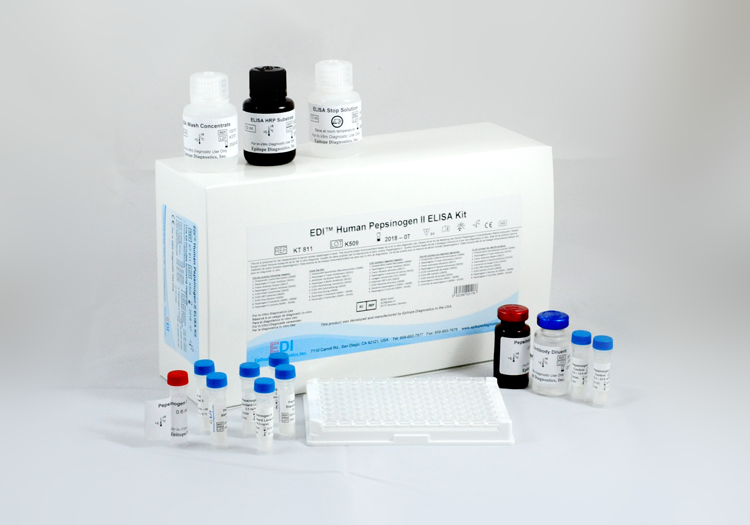Human Pepsinogen II ELISA Kit
Product Manual (.pdf)
Description
This ELISA (enzyme-linked immunosorbent assay) kit is intended for the quantitative measurement of human pepsinogen II levels in serum. Determination of human serum pepsinogen I/II ratio has been reported to be a useful tool in aiding the diagnosis of the functional states of acid-secreting gastric muscosa.
For research use only. Not for use in diagnostics procedures.
Background
Pepsinogen consists of a single polypeptide chain of 375 amino acid residues with an average molecular weight of 42 kDa. Pepsinogen I is synthesized at gastric cheif cells and mucous neck cells, while pepsinogen II is also produced by clear mucous cells of antrum, etc. The clinical applications of measuring pepsinogen I and II are a useful aid in the diagnosis of severe atrophic gastritis and stomach cancer. It has been suggested that the measurement of serum pepsinogens serve as a "serological biopsy" for predicting the presence of atrophic gastritis or superficial gastritis.
Atrophic Gastritis: It has been found that serum pepsinogen I levels falling lower than 20 ng/ml was highly specific for severe atrophic gastritis. It was also observed that serum pepsinogen I levels fell with increasing severity of mucosal damage in such cases. The diagnostic sensitivity and specificity of serum pepsinogen I levels for advanced atrophic corpus gastritis are about 92% and 90% respectively. On the other hand, the decrease in serum pepsinogen I levels in patients with pernicious anemia and atrophic gastritis was found to be associated with normal or raised pepsinogen II levels. Therefore, a pepsinogen I/pepsinogen II ratio is significantly lower than those with superficial gastritis or normal remnant mucosa.
Stomach Cancer: Low serum pepsinogen I levels were found in patients with gastric cancer, with a threefold higher incidence. Other studies have concluded that low serum pepsinogen I levels may identify persons at increased risk for intestinal types of stomach cancer.
Duodenal Ulcers: A low serum pepsinogen I level can exclude a diagnosis of duodenal ulcer. Although a high pepsinogen I level has less clinical use for establishing this diagnosis, the combination of hypergastinemia and a highly evelated serum pepsinogen I level strongly suggests the possibility of Zollinger-Ellison syndrome.
Related Kits
Specifications
Catalog no.
Target:
Species
Method
Tests Per Kit
Detection
Sensitivity / LLOD
Dynamic Range
Total Incubation Time
Sample Type
Sample Volume
Storage Temperature
KTR-811
Pepsinogen II
Human
Sandwich ELISA
96 tests
Colorimetric
0.1 ng /mL
0 - 100 ng/mL
2 hour, 20 minutes
Serum
50 µL
2-8 °C
For research use only. Not for use in diagnostics procedures.

